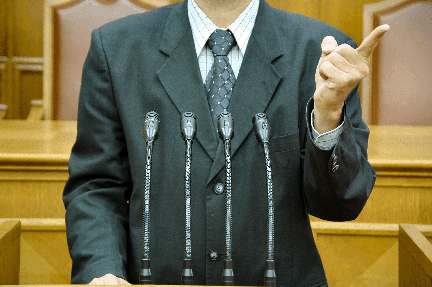Access to Debates
Unlike political broadcast advertisements, televised debates are exempt from the equal opportunities requirement, no matter who sponsors them — television networks, political parties, candidates, or unaffiliated organizations. The Federal Communications Commission created this exemption because of the news value of televised debates.
Minor party candidates have regularly challenged the equal opportunities exemption of televised debates. In 1987 in Johnson vs. FCC, the D.C. Circuit Court of Appeals ruled that no one has a First Amendment right of access to broadcast media. Broadcasters can choose whom to include in their televised debates.
In 1998, the U.S. Supreme Court ruled in Arkansas Educational Television Commission vs. Forbes that government-owned public broadcast stations may also exclude candidates from debates, as long as the decision to exclude candidates is not based on their views, but rather on their viability — often determined by the percentage of voters likely to support the candidate.
The Court ruled that the Arkansas Educational Television Commission was permitted to invite only major party candidates, or candidates with “strong popular support,” to participate in its 1992 presidential debate. Independent candidate Ralph Forbes sued the Commission when it did not include him in the debate, and on appeal, the Supreme Court found that a political debate on a public television station does not constitute a public forum.
The Debate Advisory Standards Project provides information about debates at the state and local level. The authors discuss the legal time-line of debate access and the success of some third-party candidates, such as Jesse Ventura and Ross Perot, to gain access to major televised debates. Along with legal analysis, the website also offers technical information about debate format, structure, and sponsorship.
The Commission on Presidential Debates, created in 1987, sponsors and produces presidential and vice-presidential debates. Its website includes a history of debates in the U.S. going back to 1858, transcripts of debates since 1960, and a helpful guide to organizing or hosting your own debate. Under the “About CPD” heading, select “Research and Symposia” and scroll down to read the results from focus groups held to assess the role of candidate debates in the U.S.
OpenDebates.org focuses on opening presidential debates to non-major candidates and is highly critical of the Commission on Presidential Debates. Although the site’s authors have a political agenda, under the “News” heading they include links to a variety of articles and editorials from newspapers across the country about local, state, and national candidate debates.
The University of Maryland’s College of Behavioral and Social Sciences has posted an article on its website entitled “Outside Looking In: Views of Third Party and Independent Candidates.” Authored by Paul S. Herrnson and Ron Faucheux, it was published in Campaigns & Elections magazine in 1999. The article offers an overview of the legal and practical barriers facing non-major candidates. However, because it is somewhat dated, it does not cover the recent increased publicity given to third party candidates, including Ralph Nader and his highly debated “spoiler effect” during the 2001 presidential election.
Links
Text of Arkansas Educational Television Commission vs. Forbes: http://www.law.cornell.edu/supct/html/96-779.ZD.html
Debate Advisory Standards Project: http://www.debateproject.com/introduction/
Commission on Presidential Debates: http://www.debates.org/index.html
OpenDebates.org: http://www.opendebates.org/
“Outside Looking In: Views of Third Party and Independent Candidates” by Paul S. Herrnson and Ron Faucheux at the College of Behavioral and Social Sciences, University of Maryland: http://www.bsos.umd.edu/gvpt/herrnson/art3.html

